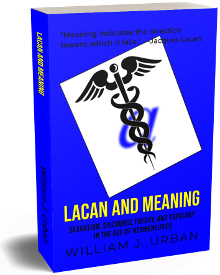Freedom qua Spontaneity:
The Lacanian Subject in the Critique of Pure Reason
WILLIAM J. URBAN
Conclusion
The central concern in this paper has been to uphold the Žižekian thesis that, beginning with the publication of the Critique of Pure Reason, Kant effectively became the first to conceptualize a Lacanian notion of subjectivity. While Kant does not consistently do so within and across all his texts, Žižek’s contention is that his critical philosophy logically necessitates such a non-substantial, purely logical apperceptive I. In Part I, we defended and further expanded on this thesis by demonstrating that, of all the sections in the Critique, we find the best evidence for a sustained appearance of this subject in the Paralogisms of Pure Reason. Quite simply, the logic of his arguments in this section is most forceful if we acknowledge how it demands a Lacanian notion of subjectivity to be already in use. In Part II, we sought to locate precisely how and where Kant articulates perhaps the most important characteristic of this subject: his capacity for spontaneity. It should therefore not be surprising to find Kant’s earliest conception of this freedom appropriate to the subject in the opening sections of the Transcendental Deduction – the very section in which that Kant first formulates the I of transcendental apperception. By closely examining the work of Allison and Heidegger, we isolated spontaneity to the independent functioning of the sensible faculty of imagination. However, with Žižek’s analysis we ultimately concluded that Kant did fail to articulate the true location of spontaneity, that radical dimension Žižek has termed ‘pre-synthetic imagination.’ This founding gesture of subjectivity, a pure self-contraction corresponding to the Freudian death drive, was lost to Kant despite having momentarily breached its domain elsewhere in the Critique.
But this is not to say that Kant failed to make further inroads in this direction with his later work. Indeed, throughout this paper we have numerous times taken short excursions outside the confines of the first Critique and with good reason. If one is to properly convey how the Kantian subject has the capacity for freedom qua spontaneity, one must necessary consider that subject an ethical subject. Reason is already practical, Kant tells us, so it is of utmost importance to examine the (ethical) activity of the subject. This makes sense if one considers that since we are dealing with a non-substantial, purely logical subject, we must necessarily consider the subject’s self-constituting activity since, strictly speaking, there is no a priori ‘rational agency’ to the subject’s ‘moral agency.’ Kant’s practical philosophy endeavors to articulate how the latter paradoxically precedes the former. Thus, what we have is the spontaneous emergence of the subject via an absolute self-relating or self-affecting tautological gesture.
While the objection can be made that the two domains of the first and second Critiques have ostensibly different concerns regarding the spontaneity of a decision (in the cognitive realm, the issue is with the complete determination of an object; while in the practical, it is of self-determination), Žižek seems to indicate that we should, at the very least, consider the analogy with their respective logics. But his full response would be much more than this: a crucial aspect to Žižek’s contention that Lacan accomplished as radical a break in the history of philosophy as did Plato and Kant before him concerns Lacan’s conception of how the subject is radically objectified through his (ethical) act. This leads to an unexpected conclusion: Kant’s practical philosophy is logically earlier than his theoretical philosophy. Likewise with their respective subjects: the (constitution of the) practical subject is logically earlier, but is perceptible (or becomes so or inscribes itself in the texture) only as a later, secondary distortion of an allegedly ‘original’ rational subjectivity to be found in Kant’s theoretical work. Again, the ethical activity of the moral subject is prior to and constitutes the rational subject. So it should not be surprising how Kant missed the proper notion of subjectivity as an ‘abyss of the abyss’ within the strict confines of the first Critique. But this does not mean that one can omit that work and proceed directly to his practical philosophy. On the contrary, while it is necessary to grapple with his practical texts to grasp the overall Truth of his critical philosophy, one must paradoxically begin the investigation with the wrong choice and articulate a subject of freedom as Kant endeavored to do with the Critique of Pure Reason. Such is the rationale of the strategy undertaken in the present paper.
Lacanian-themed puzzles

